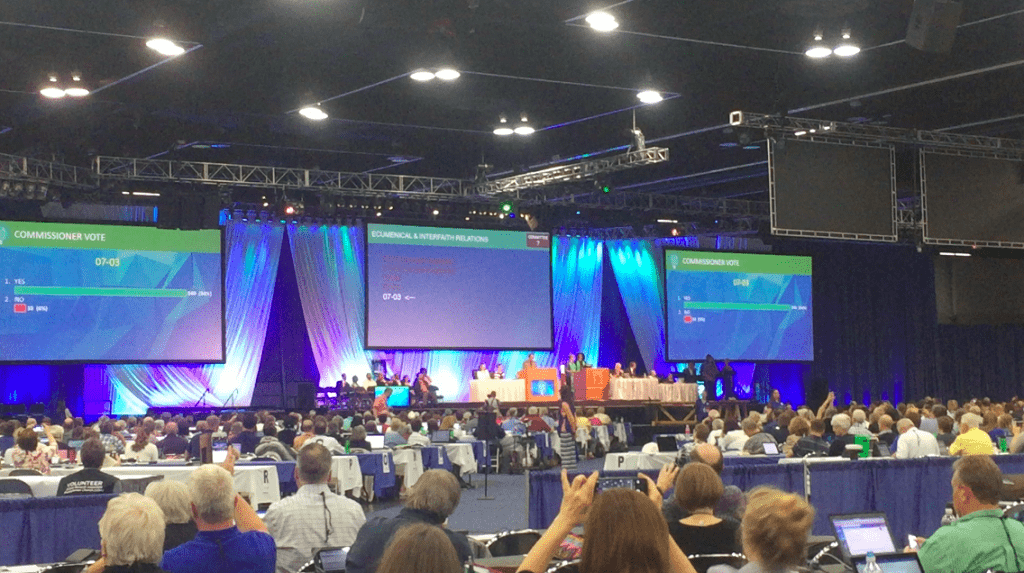The Adoption of Belhar and the Public Naming of Abuse

Author Rev. Renee Roederer
The moment was simply stunning.
With no verbal form of disagreement or dissent, the 222nd General Assembly of the Presbyterian Church (U.S.A.) voted to adopt the Belhar Confession. With this landslide vote, the Belhar Confession will be added to the PC(USA)’s Book of Confessions and will guide, inform, and convict the life of the entire church. Belhar is the first confession from the global south to be adopted by our denomination, and it addresses the ever-timely themes of racial injustice, oppression, unity, and reconciliation.
The Belhar Confession was written in South Africa in 1986 in response to the long, painful, and systematic injustices of Apartheid. Immediately after the vote to adopt the confession, Godfrey Betha, vice moderator of the Uniting Reformed Church of Southern Africa, and Allan Boesak, anti-Apartheid activist and drafter of the Belhar Confession, addressed the full General Assembly. I looked around me to see many people in tears as they recognized the historical significance of this decision. I was among of them, caught up in the beauty and power of this moment. Together, we affirmed the need to address racism and all forms of oppression in our church and nation. We held hands high and sang “We Shall Overcome.” It was a truly unforgettable moment.
___________________________________________
Parsons said that Schondelmeyer “has fought an uphill battle to find the justice and healing he needs from his own church.” He then added, “In the spirit of Belhar, religious institutions must acknowledge when they do harm in the church.”
___________________________________________
Of course, before we get too carried away or begin to rest on our laurels, it is important to recognize that the adoption of the Belhar Confession is another beginning point in our collective church life. We have a great deal of work ahead if we are to participate in God’s public naming of injustices and righting of the wrongs which are committed in our church, nation, and world.
The Confession of Belhar and the Presbyterian Church (U.S.A.) from Office of the General Assembly on Vimeo.
And in perhaps the most heartfelt moment of all, after adopting this confession and enjoying a moment of deep celebration, we had our first chance to do just that.
As we returned to our seats following this celebration, Mary Lou Cox, Moderator of the Committee on General Assembly Procedures, took the stage to recommend the approval of a new set of procedures to protect children, youth, and vulnerable adults in the PC(USA). She shared that this committee came to its recommendation after hearing testimony from Kris Schondelmeyer, a Presbyterian pastor who was sexually abused at age 17 during a youth conference. After this traumatic event, Schondelmeyer struggled to gain justice and recognition for the abuse he endured in the church.
___________________________________________
In this particular instance, immediately following the adoption of the Belhar confession, the PC(USA) made the choice to protect the most vulnerable over its own institutional reputation. We need more of this.
___________________________________________
The General Assembly voted to approve these new procedures, and in another stunning moment of unity, justice, and reconciliation, Stated Clerk Gradye Parsons apologized publicly to Kris Schondelmeyer. Parsons said that Schondelmeyer “has fought an uphill battle to find the justice and healing he needs from his own church.” He then added, “In the spirit of Belhar, religious institutions must acknowledge when they do harm in the church.”

The 222nd General Assembly approves the Belhar Confession
Photo: Ginna Bairby
In this particular instance, immediately following the adoption of the Belhar confession – and invoking its spirit and conviction – the PC(USA) made the choice to protect the most vulnerable over its own institutional reputation. We need more of this.
Since that Wednesday night, I have been pondering the intersection of these two events. I wonder how the church might embody this posture more fully. We cannot faithfully participate in God’s ministry of Kingdom-building in society unless we are willing to publicly acknowledge and right the wrongs inside our own churches. Perhaps the Belhar Confession can lead us into an era of renewed personal and public confession.
Honest self-examination and public confession are uncomfortable, sometimes painful, but they are essential. Within our congregations and the wider denomination, the people entrusted to our church’s care experience a variety of abuses, including:
- sexual abuse, assault, harassment, and misconduct,
- employment abuse and discrimination,
- systematic racism, sexism, classism, homophobia, and transphobia,
- emotional and spiritual manipulation, and
- targeted forms of scapegoating.
 Too often, we hold all of these abuses in secrecy.
Too often, we hold all of these abuses in secrecy.
We pressure survivors to keep silent in order to maintain a false perception of peace and unity. We ask the wounded to cease the public naming of their wrongs in order to shield our institutional life from public conflict. Heaping hurt upon hurt, we even begin to treat survivors as ‘perpetrators’ themselves, advancing the perception that they are ‘hurting’ our institutions with their own truth-telling.
The truth is this: The spirit and conviction of Belhar are only realized when we are willing to name and right the wrongs of injustice and oppression in our own ecclesiological and institutional life.
That Wednesday night, in a particular instance, we did so. Will we continue to protect the vulnerable by naming the truth of public wrongs? Or will we sacrifice their well-being to protect our own institutions?
*****
AUTHOR BIO: Renee Roederer is a PC(USA) teaching elder who lives in Ann Arbor, Michigan. She is a writer, itinerant preacher and speaker, and organizer of a new meetup group called Michigan Nones and Dones.”
Read resources produced on the Belhar Confession between the 221st and 222nd General Assemblies.
Read the text of the Confession of Belhar.
Check out “30 Days with the Belhar Confession”, a resource from the Presbyterian Peacemaking Program including the text of the confession and short daily reflections from Presbyterians and ecumenical partners.








